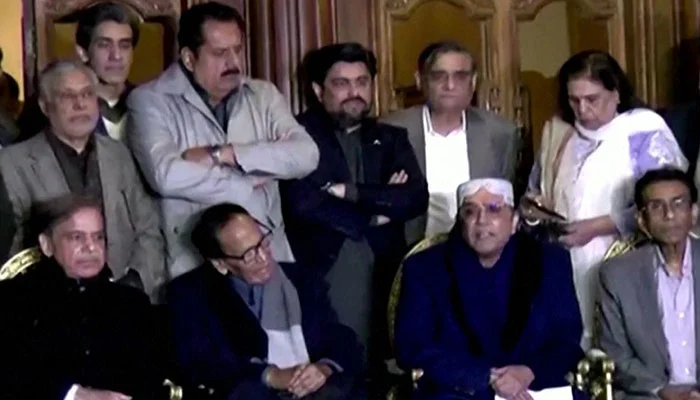ISLAMABAD: Despite its best efforts, the six-party alliance appears to be falling short of a two-thirds majority in the National Assembly, which has 207 lawmakers, according to The News on Sunday.
The political landscape in Pakistan was thrown into disarray after none of the parties’ affiliated candidates, including the Pakistan Peoples Party (PPP), the Pakistan Muslim League-Nawaz (PML-N), or the Pakistan Tehreek-e-Insaf (PTI), were able to secure a simple majority in the National Assembly in the February 8 elections.
The PML-N and PPP, with 79 and 54 NA seats, respectively, agreed to form a coalition government with other political parties such as Muttahida Qaumi Movement-Pakistan (MQM-P), Istehkam-e-Pakistan Party (IPP), Pakistan Muslim League-Quaid (PML-Q), and Balochistan Awami Party (BAP).
In the 336-member National Assembly (NA), 169 votes are required to create a government, whereas around 224 votes are required for a two-thirds majority.
After adding 20 reserved seats for women and four for minorities, the PML-N now has 108 MPs, making it the largest parliamentary party. The party was elected 75 members to the NA, and after nine independents joined, the total reached 84. With 20 reserved seats for women and four for minorities, the house now has 108 members.
Meanwhile, the PPP has 54 elected members, and the addition of 12 reserved seats for women and two for minorities brings its overall strength in the National Assembly to 68.
The total number of PML-N and PPP MNAs makes the magic number 169, needed for the formation of a government as members of both parties have a total strength of 168 members.
The MQM-P has 17 MNA’s with the addition of four reserved seats for women and one for minorities, its total strength becomes 22 members in the NA. Whereas the PML-Q got elected three members and with one independent joining it, and the addition of one reserved seat for women, its strength in the NA has reached five.
Out of 99 independent candidates, who made it to the lower house of the parliament, 81 PTI-backed candidates have joined the Sunni Ittehad Council (SIC), while eight independent candidates opted not to join any party and got the status of independents in the NA.
The Jamiat Ulema-e-Islam Fazl (JUI-F) has six members and was allotted two reserved seats for women, making its total strength eight. Meanwhile, the IPP has three MNA members in the assembly.
Other parties, including Majlis-e-Wahdat-e-Muslimeen Pakistan (MWM), BAP, Balochistan National Party (BNP), National Party, Pakhtunkhwa Milli Awami Party, and Pakistan Muslim League-Zia, have one seat each in the lower house.







